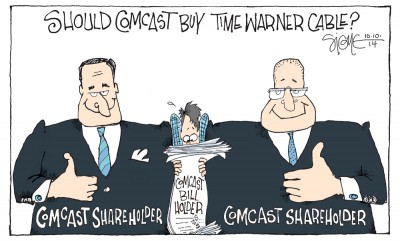 Californians get a reprieve from the menacing Comcast-Time Warner Cable merger with an announcement from the California Public Utilities Commission it is putting further consideration of the merger deal on hold until later this spring.
Californians get a reprieve from the menacing Comcast-Time Warner Cable merger with an announcement from the California Public Utilities Commission it is putting further consideration of the merger deal on hold until later this spring.
Consumer groups loudly protested the PUC for holding its single public hearing on the merger in San Francisco, which has been served almost exclusively by Comcast for years. Most of the impact of the merger will be felt in Los Angeles, where Time Warner Cable provides service to around 1.8 million customers. The deal also involves Charter Communications customers in the region, who will also end up as Comcast customers if the deal is approved.
The PUC eventually agreed to hold a meeting in Los Angeles, but then scheduled it for Good Friday. Now it has changed the date for the four-hour public input session to April 14, one day before tax returns are due. No specific information about the time of the meeting could be located on the CPUC website, but we do know it will be held in the auditorium of the Public Utilities Commission’s building at 320 West 4th St. in downtown Los Angeles.
That the CPUC seems to be heading towards approving the deal does not come as much of a surprise. The CPUC has been surprisingly friendly to the communications companies it regulates, in the past approving questionable statewide video franchise reforms on behalf of AT&T and generally permitting most of the merger and consolidation transactions that arrive at the commission for review.
An advising administrative law judge attached a long list of recommended temporary conditions that should be included in any approval, covering everything from lobbying about municipal broadband to discount Internet service for the poor. Although Comcast claims it is willing to accept many of the short-term conditions, it also signaled objections to some of the most significant requirements, a potential sign Comcast might exercise its legal options in the future to be rid of the deal’s most onerous conditions.
Independent consumer groups not financially aligned with the cable industry are almost universally opposed to the merger as are many Californians.


 Subscribe
Subscribe
I suppose they believe the cable cartels are a benefit to California which is home to a really big chunk of the entertainment industry and directly benefits from the bloated overpriced bundles and lack of real competition. Consumers be damned.
It is more complex than that. It is underreported that Time Warner Cable and Comcast represent radically different visions of the future. Time Warner split the entertainment business from the “pipes” business so these could follow different trajectories. Comcast went in the opposite direction, merging with NBC and Universal. The Comcast merger may be good for the slice of Hollywood that is associated with NBC/Universal, but for all the rest of Hollywood and the media biz it means there will be fewer distinct buyers for their content and Comcast calls the shots. Since customers can’t choose between Comcast and Time… Read more »